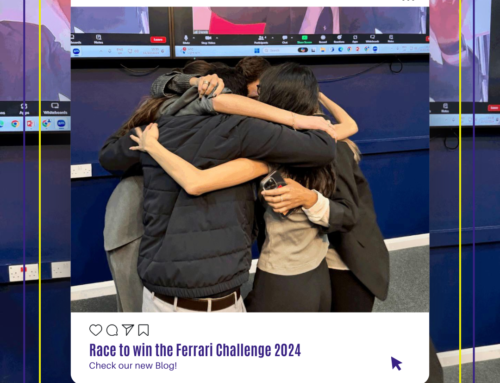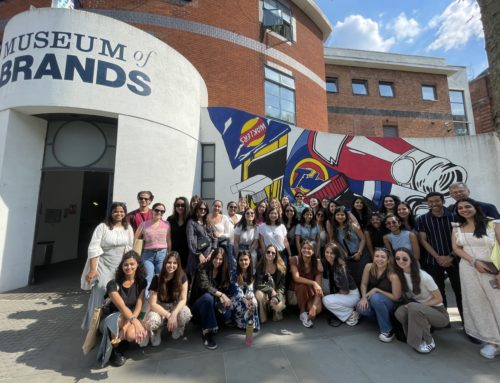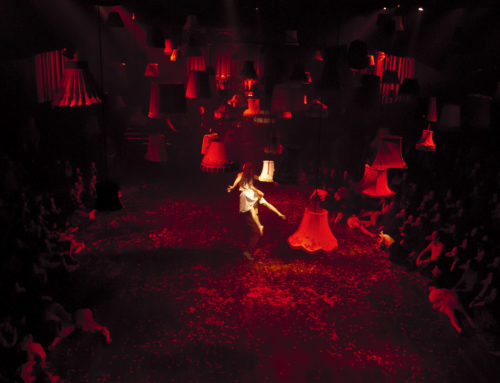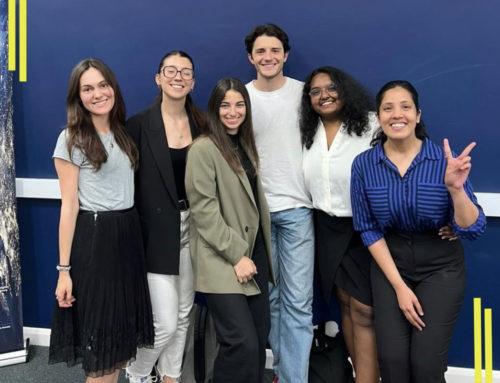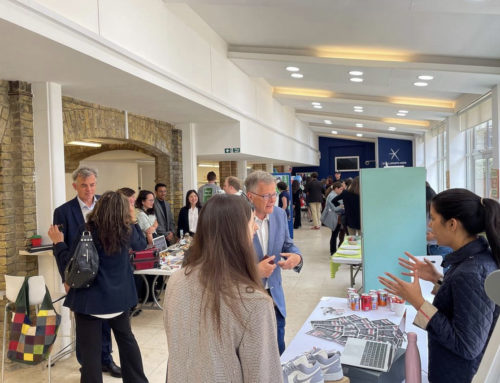Career spotlight: Ashleigh Steinhobel
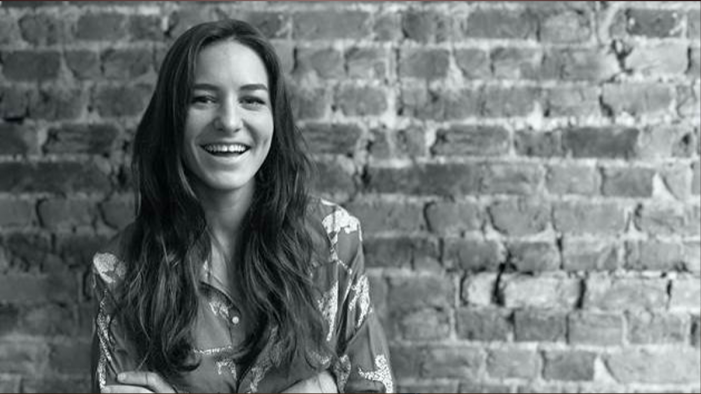
While reading Campaign Magazine we came across a very interesting article about branding written by almuna Ashleigh Steinhobel (here). We thought it was a great reason to catch up!
It is amazing that your article on branding was featured in Campaign Magazine. Could we start with a little bit of an introduction first? Could tell us a bit more about your name, your background, and what you do now?
Sure! My name is Ashleigh Steinhobel and I’m South African. I grew up in Johannesburg and studied finance at the University of Cape Town, specifically Investment Management and Portfolio Securities. Creativity has always run in my blood. My Dad built one of the foremost experiential agencies in South Africa from the ground up, so dinner table chat was always peppered with agency insights and big ideas. Intuitively I always knew I’d end up in a creative realm.
Following an itch to live overseas, I came over to London to do the Master’s in Marketing and Creativity at ESCP Europe. This was a truly fantastic move because it opened my eyes to a whole new world of branding, innovation, and disruptive business models. It was also a new way of learning, much more hands-on and application-based than my finance degree. The course catalysed where I’ve gone in my career. I joined a startup founded by one of my MMK colleagues and then moved on to Pearlfisher, a highly renowned global strategic brand consultancy. After five years there, I’m now at a younger agency called JDO, which is best known for its design work in the worlds of beauty and booze.
How are you enjoying JDO? And how is it different from what you did at Pearlfisher?
It’s both similar and different. I learnt the ropes at Pearlfisher, having started out in the Marketing & Communications team and then transitioned over to Strategy. This was an area of the business I felt a deep and immediate connection to in terms of my passion and skillset. I knew nothing about brand strategy at first but was fortunate enough to work with some incredible people who mentored and inspired me, as well as a spectrum of fantastic brands from entrepreneurial challenger startups to the established icons of food, alcohol, and personal care. Pearlfisher was a really rigorous training ground and a fantastic platform for growth.
At JDO, the challenge is different in that the agency’s strategic offering is less defined. We are going through a period of rapid expansion which is a real triumph in these uncertain times. Part of that involves crystallising our offer and building out our Strategy team. I started at JDO in lockdown which was interesting but also not as difficult as I’d expected. I’m excited to be back in an office environment soon, as I thrive off the energy and diversity of face-to-face interactions.
How do you think the pandemic has affected the business?
I experienced different phases of the pandemic at both Pearlfisher and JDO and luckily, both companies have fared really well through the crisis. When I joined JDO, the London team was about seven people; now it’s doubled in size. We are also lucky that a lot of our clients operate within food, drink and personal care, all categories that did not suffer drastically through the pandemic.
I’ve definitely felt working from home to be an injection of fresh process. Having experienced the way in which a flexible working model can be equally as, if not more, effective as a 5-day in-office workweek, I feel it’s opened businesses up to embrace positive change. People now have more freedom to plan their workweeks, and physical spaces are being rethought in terms of what they should be used for. At a broader level, I feel that the idea of ‘brand purpose’, what brands believe in and how they activate that belief, was also thrust into the spotlight by the pandemic. This cascades into the value of what we do as Strategists – defining that purpose and expressing it with meaning through design.
You said in Campaign magazine that the Covid-19 crisis has affected branding. Could you explain more about what you meant and what your recommendation would be?
In the article I wanted to discuss the idea of ‘distinctiveness’, a term we use a lot in branding and design, at a time where everything had become incredibly indistinct. Days, meals, food; everything seemed to be blurring together through lockdown, and what’s interesting is that we’ve seen a similar phenomenon take hold of brands over the last decade. The age of ‘blanding’ has spawned tech start-ups that look like fashion brands that look like DTC subscriptions boxes – all claiming to be ‘disruptors’ yet blending into a sea of samey names and millennial pink.
Yet we know that the world’s most successful brands have not been built by blending in. Moreover, often their distinctiveness comes not from a shape or colour, but from the experience they create. Think of the corner crack of thick chocolate as you bite into a Magnum, or the lime ritual of drinking a Corona beer. At a time when we had been so sensorially starved and removed from the physical worlds of brands, this seemed a more relevant view on distinctiveness than ever.
So, my recommendation was that brands should think differently about distinctiveness as we emerge from the screen-bound fog of lockdown. To be multidimensional and experiential. To know their core truth and bring it to life with vigour and imagination.
Can you tell me more about the challenges you face at JDO?
At a macro level, the agency landscape is changing. There’s a lot of consolidation at one end, with big consulting players entering the creative space. Whilst at the other end, we’re seeing the accelerated growth of specialist or boutique agencies. So, crafting a truly robust and relevant role to stand out from the crowd is a challenge for agencies like us. Also, as design becomes increasingly commoditised, demonstrating the value of strategy and building consultative partnerships with brand teams is key.
The role of brands in culture is also changing. It’s an exciting but also a precarious time for brands: consumers are cynical, informed, and quick to hold brands accountable. Plus, as I mentioned earlier, it’s no longer enough for ‘purpose’ to live as a nebulous statement on a brand’s website instead of something it lives, breathes, and acts on every day. So more than ever, it’s crucial that we as an agency remain abreast of the change we see and are able to advise our clients on how they can make a real difference at all levels: for consumers, culture, and the collective.
What are your most valuable takeaways from the MMK?
There are so many. As I suggested earlier, I think the MMK taught me to think critically and to ask questions. Instead of giving us piles of textbooks to learn from, it required us to think, interpret and express an opinion, insight, or idea. I’ve found that to be a really valuable skill in the workplace and beyond.
I also found the exposure to brands and businesses that were changing spaces or disrupting industries to be a compelling aspect of the course. In my year, one of our guest brand lectures was Uber at a time when they were just launching in London. They were doing some epic ‘guerrilla style’ marketing and we were brought in to help design flash campaigns. It was really valuable to get a sense of their real-world challenges and the importance they placed on creativity to do things differently.
The third takeaway would probably be the importance of collaboration because everything was done in project teams. Everyone in the MMK was so international and so diverse, which meant that each project came with a melting pot of references, ideas, influences, skillsets, and communication styles. So, understanding how to empathise with different personalities and how to get the best out of creative people was something that I have taken forward in my career, as I work with highly creative minds all the time.
What would you tell somebody who is thinking of doing the MMK but was on the fence?
I think I’ve referred about five people since I left! I’d say that if it’s something you’re thinking about, then you should definitely do it, because you only stand to gain from it. Whilst things have probably changed a lot given the digital transformation through the pandemic, there was a lovely social aspect to the course. You make fantastic connections with both classmates and lecturers. It’s a really close and connected environment on top of the great things you learn.
Above all, I’d recommend the course because – like the practice of marketing itself – it is always adapting and evolving. Your MMK experience would have been different to mine, which will be different to someone’s in 10 years’ time. Because there is a focus on staying abreast of trends, business and brands, the course is kept fresh and cutting-edge. And that’s essentially the industry that we operate in. Technology is advancing. Shifts are taking place all the time that either challenge or enhance our creativity. So, the fact that the course never sits still is definitely one of its biggest assets.

